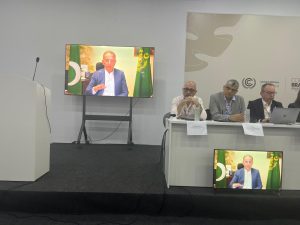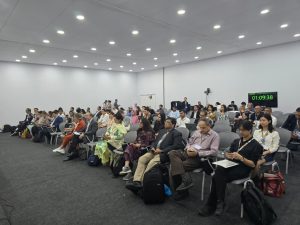ISLAMABAD, Nov 16 (APP):Pakistan has urged the international community to act swiftly to protect the rapidly deteriorating cryosphere, warning that accelerated glacier melt in the Hindu Kush–Karakoram–Himalaya (HKH) region is placing millions at increasing risk.
In a virtual address to a high-level dialogue at COP30 in Belem, Brazil, Pakistan’s climate minister, Senator Dr Musadik Masood Malik, said the world is witnessing “unprecedented” changes across glacier systems, permafrost zones and snow-covered regions.


The discussion, hosted by Pakistan’s Ministry of Climate Change and Environmental Coordination in partnership with international organisations, brought together officials, scientists and specialists from Nepal, Bhutan, Turkiye, Azerbaijan, ICIMOD, UNDP, UNESCO and the Asian Development Bank.
Dr Malik said the HKH—often referred to as the planet’s “Third Pole”—is warming nearly twice as fast as the global average, threatening the largest freshwater store outside the polar regions. Pakistan, home to around 13,000 glaciers, is already facing rapid retreat, expanding glacial lakes and a sharp increase in glacial lake outburst floods.
He said these changes are beginning to alter the natural flow of the Indus River, damaging infrastructure, undermining farmland and heightening water insecurity downstream. For mountain communities, he said, climate change has become “a daily crisis”.
Scientific assessments presented at the event indicated that up to 65% of HKH glaciers could vanish by the end of the century under high-emission scenarios.
Experts at the dialogue noted that Pakistan’s northern regions are already experiencing frequent GLOF events, which have destroyed homes, schools, roads and cropland in Gilgit-Baltistan and Khyber Pakhtunkhwa.
Erratic river flows, they added, are also weakening agricultural output, disrupting hydropower generation and straining water supplies in major cities, while altering ecosystems and local economies across the Indus basin.
Participants from Turkiye, Azerbaijan, Nepal, Bhutan and ICIMOD called for stronger regional frameworks for scientific cooperation, improved early-warning systems and targeted investments to boost community preparedness.
Representatives from UNDP, UNESCO and the Asian Development Bank reiterated their support for countries across the HKH.
The dialogue ended with a call for increased regional coordination, predictable climate finance and urgent global engagement to safeguard the fragile HKH cryosphere and the millions who depend on its water systems.

